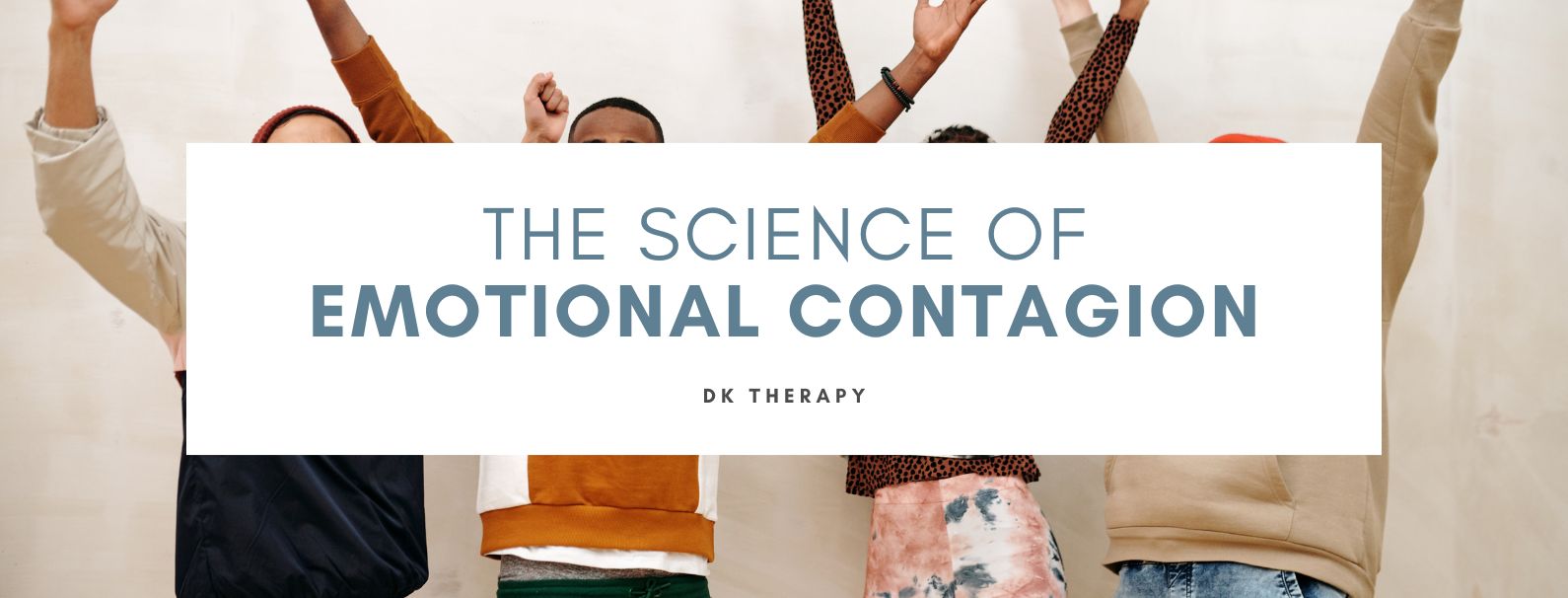
Have you ever found yourself feeling happier than usual after being around someone cheerful? Maybe you’ve felt the opposite—anxious after spending time with someone who’s stressed? You may have experienced emotional contagion, which is a psychological phenomenon where emotions spread from person to person.
What Emotional Contagion Is and Isn’t
 Emotional contagion refers to people essentially “catching” the emotions of others through nonverbal cues, body language, tone, and facial expressions. It’s not the same as one person manipulating another, nor is it quite like empathy. Empathy involves understanding or sharing someone else’s feelings, but emotional contagion is more automatic and less of a conscious realization.
Emotional contagion refers to people essentially “catching” the emotions of others through nonverbal cues, body language, tone, and facial expressions. It’s not the same as one person manipulating another, nor is it quite like empathy. Empathy involves understanding or sharing someone else’s feelings, but emotional contagion is more automatic and less of a conscious realization.
It’s also important to note that emotional contagion different from emotional influence as well, as influence often involves persuasion or conversation. Contagion can spread without words.
How Does It Work?
Scientists believe emotional contagion is both neurological and psychological. To understand how emotions can spread, though, it helps to look at the brain and body systems that make it possible. Several mechanisms help explain how we can “catch” feelings from others without even realizing it.
Mirror Neurons
These special brain cells fire both when you perform an action and when you see someone else perform the same action. When you observe someone smiling, your mirror neurons activate as if you are smiling, which can lead to a shift in your emotional state.
Facial Feedback Hypothesis
This theory suggests that imitating another person’s facial expression can trigger the same emotional experiences. For example, if you happen to frown when someone else is upset, the act of frowning can make you feel more distressed.
Social Synchrony
Humans tend to unconsciously sync up with people around them, which can manifest in posture, speech rhythm, or even mood. This sort of synchronization encourages cooperation in a team setting, but it can also enable emotions to sweep through the group.
Attention and Perception
As people, we’re wired to pay attention to emotional cues. When we perceive heightened emotion in others, especially strong emotions like anger or joy, our bodies and minds react instinctively.
Realistic Examples of Emotional Contagion
Emotional contagion doesn’t only occur in isolated groups, or between people who share a close bond. One might experience this phenomenon:
- At Work: A manager walks into the office with a visibly frustrated expression and short, jarring tone. Without saying much, the atmosphere is suddenly tense. Colleagues become short-tempered or withdrawn even if they’re not sure why.
- During Social Events: At a party, one person starts laughing uncontrollably at a story. Soon, others around them begin to laugh too and the laughter becomes more about the shared enjoyment than the joke itself.
- On Social Media: Emotional contagion doesn’t even require physical presence. Studies have shown that exposure to positive or negative posts online can influence users’ emotions and behaviors.
- In Families: If a parent is consistently anxious, children may begin to exhibit similar stress responses. Emotional states can move through residences without instruction or discussion.
Why Emotional Contagion Matters
Understanding emotional contagion can help you become more aware of both your surroundings and self. Sometimes, interactions with others can lead to emotional boosts or drains, and it’s especially noticeable in shared spaces like schools or offices.
Being aware of emotional contagion is especially relevant for group leaders, such as teachers, caregivers, managers, and even parents. The aura these individuals put forth can quite easily shape the experiences of others. Making a conscious effort to “read the room” can help you create a more positive, welcoming environment.
Though emotional contagion is largely unconscious, this process can have a significant impact on our social interactions. Being mindful about the emotions we project and absorb, we can communicate more effectively and build stronger relationships.
If you’re struggling and you’d like to work with a dedicated mental health professional, reach out to DK Therapy and schedule an appointment with our office.




